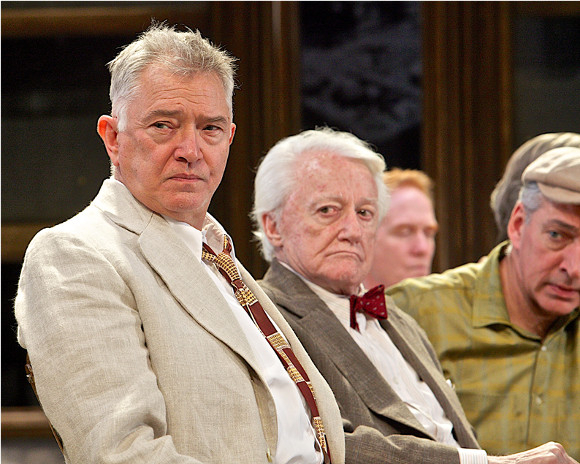Twelve Angry Men

© Francis Loney
Half a century may have elapsed since this absorbing and impeccably constructed drama was last seen in London, but its fury has not mellowed with age. Adapted for the stage by Reginald Rose from his own 1954 teleplay, Twelve Angry Men was subsequently filmed by Sidney Lumet in a version that gave Henry Fonda one of his best movie roles away from the wild west – a claustrophobic huis clos that's a million miles from the plains of Texas.
The premise of an all-male, all-white jury struggling to reach a unanimous verdict in the case of a 16-year-old black boy accused of murder may seem dangerously dated, but not bit of it: the play has a mature, liberal heartbeat that's bold even by today's standards. Devoid of sentimentality yet loaded with compassion, its message is timeless.
Within Michael Pavelka's striking, skeletal set a dozen American archetypes grind against each other as they replay both the trial and the killing itself. It's as gripping as a police procedural, as suspenseful as a drawing-room whodunnit. Confrontations are savage and uncomfortable truths are spilled by the most agitated members of the twelve while, in a physical symbol of the dramatic trajectory, the jury-room table traces a single, barely perceptible 360-degree revolve that is only completed at the play's end.
Christopher Haydon's production may look effortless but the attention to detail says otherwise. More than any slanging matches it's the inner life of the disparate dozen that grips the audience: the sidelong glances, accidental eye contact and wary manoeuvring for position in an overheated room. Even when the iconic veteran Robert Vaughn stumbled over his lines it seemed all of a piece with the enervating atmosphere of that sultry summer night.
Producer Bill Kenwright has hired twelve good men and true to give the play its due. Martin Shaw anchors proceedings with his solid good-guy persona, opposed by Paul Anthony-Barber as a voice of reason and Miles Richardson, slightly too Runyonesque as an unreconstructed bigot. Nick Moran turns in a convincing transatlantic variant of his wide-boy shtick while Jeff Fahey, tingling with inner torment, inhabits his tortured reactionary figure (and the purest antagonist to Shaw's hero) with such palpable conviction that I feared for his blood pressure.
Age has barely withered Twelve Angry Men because it's not just a well-made play, it's a meticulously plotted arc of persuasion set within the unities of time, place and action. Rose is less concerned with innocence and guilt than with right and wrong. Did the boy commit the murder? That's not the point. It's the process that matters, the duty to decide beyond reasonable doubt, and the jurors' unease as they confront human nature – not least their own.










